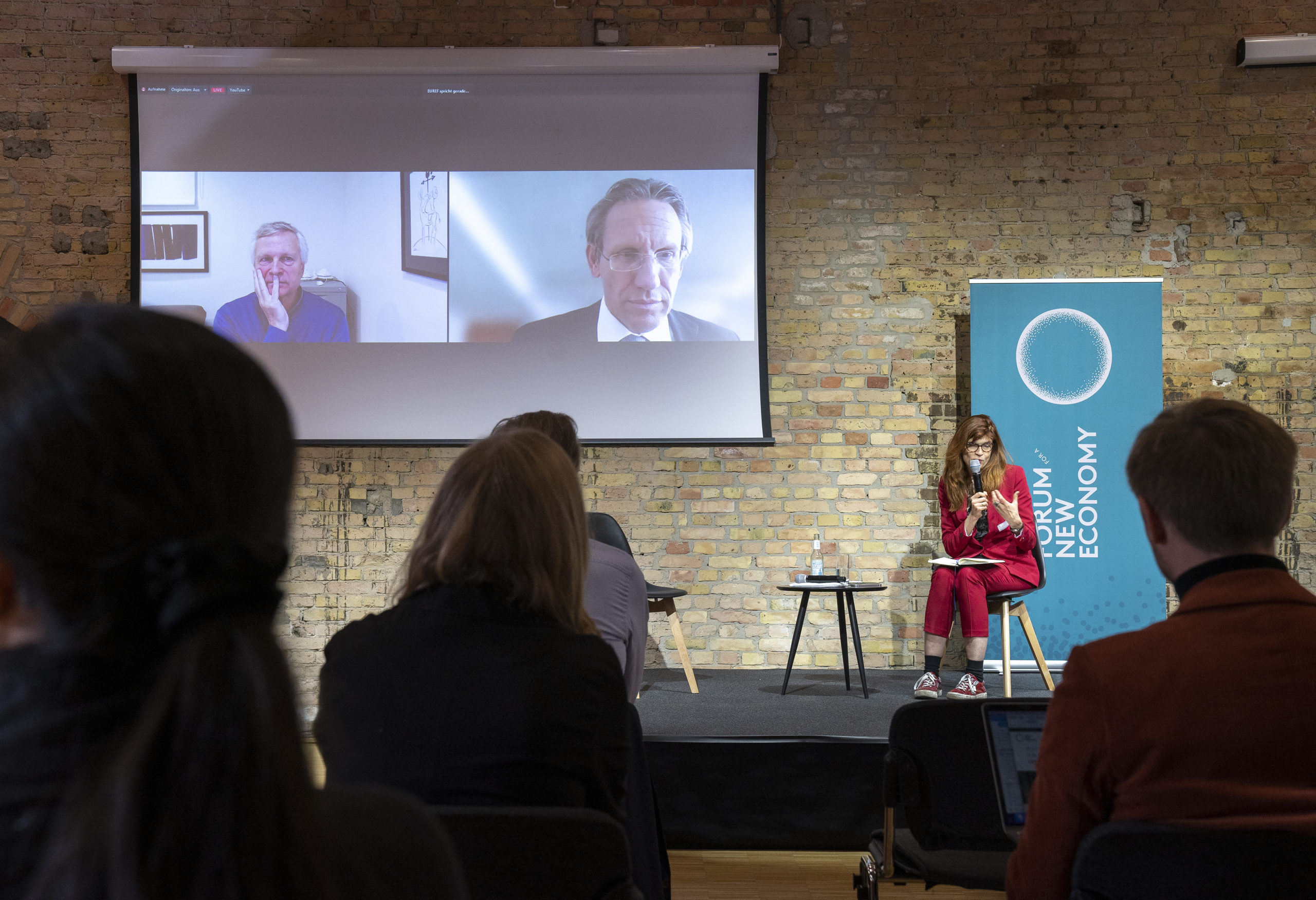THE STATE
Rodrik and Kukies in Conversation: The Return of Good Jobs in Bad Times
What can governments do to ensure the creation of good jobs even in times of war and inflation? Dani Rodrik and Olaf Scholz's chief economist Jörg Kukies discussed this at our New Paradigm Workshop.
BY
SONJA HENNENPUBLISHED
7. OCTOBER 2022READING TIME
4 MIN
After decades of booming precarious jobs in both the U.S. and Germany, Joe Biden and the traffic light coalition have made it their top priority to restore “good jobs”. However, progress is under threat due to the recent geopolitical disruptions, recession, and inflation. At our XI New Paradigm Workshop, we invited good jobs mastermind and Harvard economist Dani Rodrik to discuss with Jörg Kukies, chief economist of chancellor Olaf Scholz and G7/G20 sherpa, what politics can do to ensure that good jobs return even in the current times of crises.
First and foremost, Rodrik emphasized that the decline in good jobs since the 1980s is more than a problem of inequality and social exclusion but causes severe frictions in social cohesion that result in the rise of populist movements all across Europe and the US.
“What is happening in our labor markets - the polarization, the weakening of collective bargaining, the low wages - is essentially akin to the problem of climate change. Where climate change is the biggest threat to our ecological environment, labor market shocks are the biggest threat to our social and political environment.”
Currently, Rodrik stated, labor market policies more often than not are just a byproduct of other policies. In the US, policy goals like the reshoring of supply chains or the climate transition, are supposed to benefit labor markets and ultimately create good jobs. Such an incidental effect, according to Rodrik, is unlikely to be sufficient. Rather, it would be necessary to further along a more productivist approach to industrial policymaking, one that specifically targets the creation of good jobs and is implemented in addition to collective bargaining and higher wages.
“We do need a specific good jobs policy, not one that is simply a byproduct to other policies.”
Such a good job policy, according to Rodrik, would focus on strengthening existing local and regional networks, combining workforce with business development, the mobilization and empowering of local cross-sector coalitions, and a focus on new labor-friendly technologies.
This kind of new industrial policy, argued Rodrik, is different from the way it was traditionally conducted, which has been largely top down and about trade. This new kind needs to be reoriented, focused much more on services, on small and medium sized enterprises, and has to envision a different role for the public sector, one that is much more collaborative and goal setting.
Jörg Kukies on the other hand emphasized that good jobs are on top of the policy agenda for the German government. And, he said, in alignment with Rodrik’s postulations, creating good jobs is not just a side effect, but a core element of the policy package for the German government. According to Kukies, the two elements that are essential for the creation of good jobs, apart from qualification, are good pay and job security. Against the backdrop of the current crises, this security is at risk. Massive support for private households and companies is therefore necessary.
“To protect jobs, we have to preserve the industrial base. The number of jobs at risk due to the soaring energy prices is extremely high. In that sense, getting control on energy prices is a core element of the good jobs agenda.”
Kukies also emphasized the importance of job training programs, the combat of the erosion of purchasing power due to inflation, and the promotion of inter-EU migration to address skill shortages. Moreover, to foster the good jobs agenda, the G7 employment ministers are currently developing a joint action plan for inclusive continuous education and a roadmap towards safe and healthy work.
“The need to qualify people is one of the biggest constraints. The sheer size of investment to generate the 250 gigawatts of solar etc. planned as part of the transition, all of that will be a massive investment into systems, hard assets, but of course people. We can only deal with the transition by massively investing in skills.”
In this context, Kukies also mentioned the important role trade unions can and must play in the net zero transformation, as well as the need for significant public sector investments. He also added that a lot of work on the good jobs agenda has to be done around the gender balance. Women have been disproportionately affected by the deterioration of working conditions during the pandemic.
At the outset of the discussion, Rodrik concluded that the general narrative about economic policy making had changed under Biden. “When you compare language, Biden to Clinton, then the language has moved remarkably in terms of the role of industrial policy, the concentration of power, taxation, addressing the climate transition, and the good jobs agenda, too.” According to Rodrik, there is a new understanding now that the problems cannot be resolved simply by market forces but that stronger collective power is needed.
Perhaps now is the time for this void to be filled with a more adaptive pragmatism, with a new vision, one that allows us to think imaginatively and constructively about the crises – and the solutions to them.
